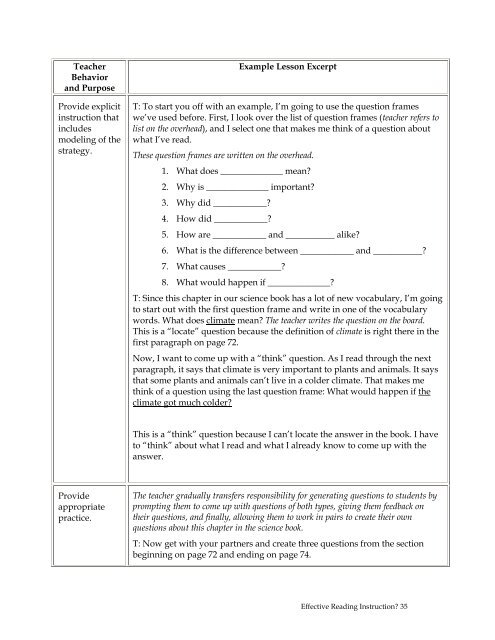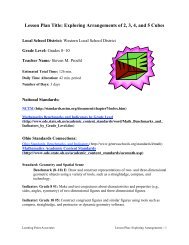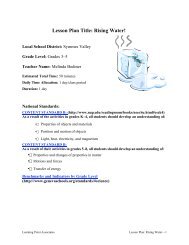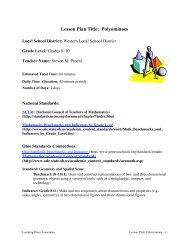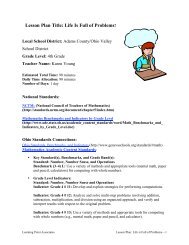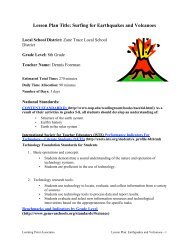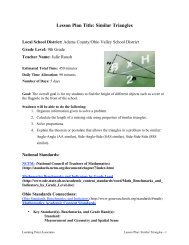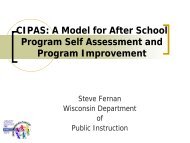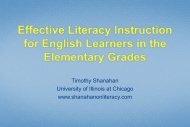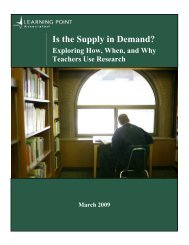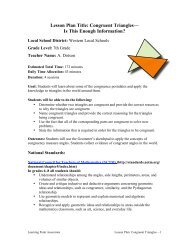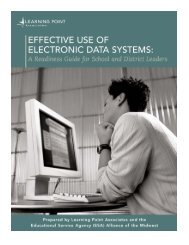A Closer Look at the Five Essential Components - Learning Point ...
A Closer Look at the Five Essential Components - Learning Point ...
A Closer Look at the Five Essential Components - Learning Point ...
Create successful ePaper yourself
Turn your PDF publications into a flip-book with our unique Google optimized e-Paper software.
Teacher<br />
Behavior<br />
and Purpose<br />
Provide explicit<br />
instruction th<strong>at</strong><br />
includes<br />
modeling of <strong>the</strong><br />
str<strong>at</strong>egy.<br />
Provide<br />
appropri<strong>at</strong>e<br />
practice.<br />
Example Lesson Excerpt<br />
T: To start you off with an example, I’m going to use <strong>the</strong> question frames<br />
we’ve used before. First, I look over <strong>the</strong> list of question frames (teacher refers to<br />
list on <strong>the</strong> overhead), and I select one th<strong>at</strong> makes me think of a question about<br />
wh<strong>at</strong> I’ve read.<br />
These question frames are written on <strong>the</strong> overhead.<br />
1. Wh<strong>at</strong> does ______________ mean?<br />
2. Why is ______________ important?<br />
3. Why did ____________?<br />
4. How did ____________?<br />
5. How are ____________ and ___________ alike?<br />
6. Wh<strong>at</strong> is <strong>the</strong> difference between ____________ and ___________?<br />
7. Wh<strong>at</strong> causes ____________?<br />
8. Wh<strong>at</strong> would happen if ______________?<br />
T: Since this chapter in our science book has a lot of new vocabulary, I’m going<br />
to start out with <strong>the</strong> first question frame and write in one of <strong>the</strong> vocabulary<br />
words. Wh<strong>at</strong> does clim<strong>at</strong>e mean? The teacher writes <strong>the</strong> question on <strong>the</strong> board.<br />
This is a “loc<strong>at</strong>e” question because <strong>the</strong> definition of clim<strong>at</strong>e is right <strong>the</strong>re in <strong>the</strong><br />
first paragraph on page 72.<br />
Now, I want to come up with a “think” question. As I read through <strong>the</strong> next<br />
paragraph, it says th<strong>at</strong> clim<strong>at</strong>e is very important to plants and animals. It says<br />
th<strong>at</strong> some plants and animals can’t live in a colder clim<strong>at</strong>e. Th<strong>at</strong> makes me<br />
think of a question using <strong>the</strong> last question frame: Wh<strong>at</strong> would happen if <strong>the</strong><br />
clim<strong>at</strong>e got much colder?<br />
This is a “think” question because I can’t loc<strong>at</strong>e <strong>the</strong> answer in <strong>the</strong> book. I have<br />
to “think” about wh<strong>at</strong> I read and wh<strong>at</strong> I already know to come up with <strong>the</strong><br />
answer.<br />
The teacher gradually transfers responsibility for gener<strong>at</strong>ing questions to students by<br />
prompting <strong>the</strong>m to come up with questions of both types, giving <strong>the</strong>m feedback on<br />
<strong>the</strong>ir questions, and finally, allowing <strong>the</strong>m to work in pairs to cre<strong>at</strong>e <strong>the</strong>ir own<br />
questions about this chapter in <strong>the</strong> science book.<br />
T: Now get with your partners and cre<strong>at</strong>e three questions from <strong>the</strong> section<br />
beginning on page 72 and ending on page 74.<br />
Effective Reading Instruction? 35


